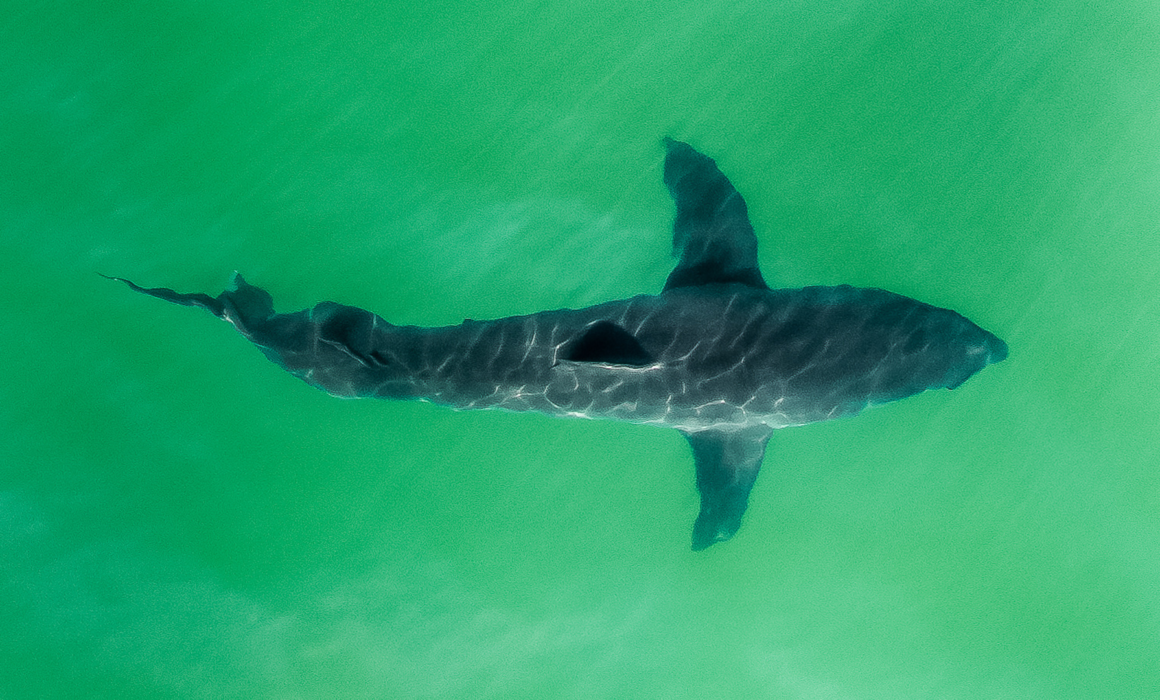
An estimated 800 great white sharks visited the waters of the Atlantic side of Cape Cod between 2015 and 2018, making it one of the world’s top gathering places for the predators, according to a new study.
The study, published Thursday in the journal Marine Ecology Progress Series, was based on underwater video identification of 393 different great white sharks during 137 boat trips off Cape Cod, in which researchers had nearly 2,295 encounters with the sharks. Armed with those observations, researchers used a “novel modeling framework” to estimate the overall population in the area.
“One thing that makes estimating the abundance of white sharks really tricky — and is why we had to go to so much trouble to develop an entirely new model to do so — is because they’re constantly moving,” said lead author Megan V. Winton, a research scientist at the Atlantic White Shark Conservancy in Chatham. “They can cover so much ground. Some of them spend a lot of time here off of Cape Cod. Some of them just kind of breeze through the area. There’s a constant flux into and out of the region.”
The results suggest that “Cape Cod is among the larger aggregation sites worldwide” of great white sharks, the study said, noting studies of the sharks’ numbers in places such as California, South Africa, Mexico, and Australia.
How many great white sharks are roamingthe northwest Atlantic is not known, Winton said. The estimate of their numbers off Cape Cod is “the first estimate of abundance for the species anywhere in its northwest Atlantic range,” she said.
“So it’s a start,” she said. “It provides a baseline that we now have that we haven’t had for this population ever — that can be used to monitor the performance of conservation and management measures for the species.”
Taylor Chapple, a professor at Oregon State University whose Big Fish Lab studies the movements and dynamics of large marine predators, said he was “excited to see this work come out.”
“Understanding the role of predators off our coast is critical,” he said.
He said he was not surprised that the estimate was “in the magnitude range of other global aggregations that have been studied thus far.”
“It’s an important place, an incredibly seasonally critical spot for sharks,” he said.
The number of the sharks off Cape Cod peaks in late summer and early fall as the sharks move into the waters to feed on the “abundant gray seal population,” researchers saidin the study. Researchers believe the seal population in the region is about 50,000 in the summer, providing the sharks an enticing buffet.
Among the sharks that researchers encountered during their surveys, the most common length was 3 meters, or almost 10 feet, with some longer than 16 feet, or about the length of a Toyota Camry.
Winton emphasized that the findings don’t mean there’s an army of 800 great white sharks mustered every day off Cape Cod beaches.
While the study estimated that in some peak months there can be several hundred of the sharks off Cape Cod, “they weren’t all here piled up off of the beaches all at one time,” she said. “That’s hundreds of individuals moving through the area over the course of a month.”
Still, people should be aware that “Cape Cod is a white shark hotspot, and that the summer and the fall are peak activity times,” she said.
“It’s really important to reiterate that the risk of having a bad interaction with a white shark is low. They are very cautious, selective predators. But there is certainly an increased presence of white sharks here,” she said.
“That is why we work so hard to get the information that we’re generating from the science that we’re doing here into the hands of public safety officials and, most importantly, into the hands of the public,” she said. “So that they can modify their behavior and be what we call ‘shark-smart,’ to reduce the risk of having a bad interaction.”
The conservancy has information about sharks on its website and social media accounts and offers a free app, Sharktivity, “where people can see where we’re seeing white sharks over the course of the season.”
Great white shark research conducted on the same boat has led to other studies over the years, as well as stunning video of shark encounters.
The study area included the ocean off Provincetown, at the tip of Cape Cod, down to the Cape’s elbow and the island of Monomoy, a favorite seal hangout.
Winton’s co-authors were Gavin Fay, a professor at the UMass Dartmouth School for Marine Science and Technology and Greg Skomal of the Massachusetts Division of Marine Fisheries.
Skomal recently authored “Chasing Shadows: My Life Tracking the Great White Shark.”